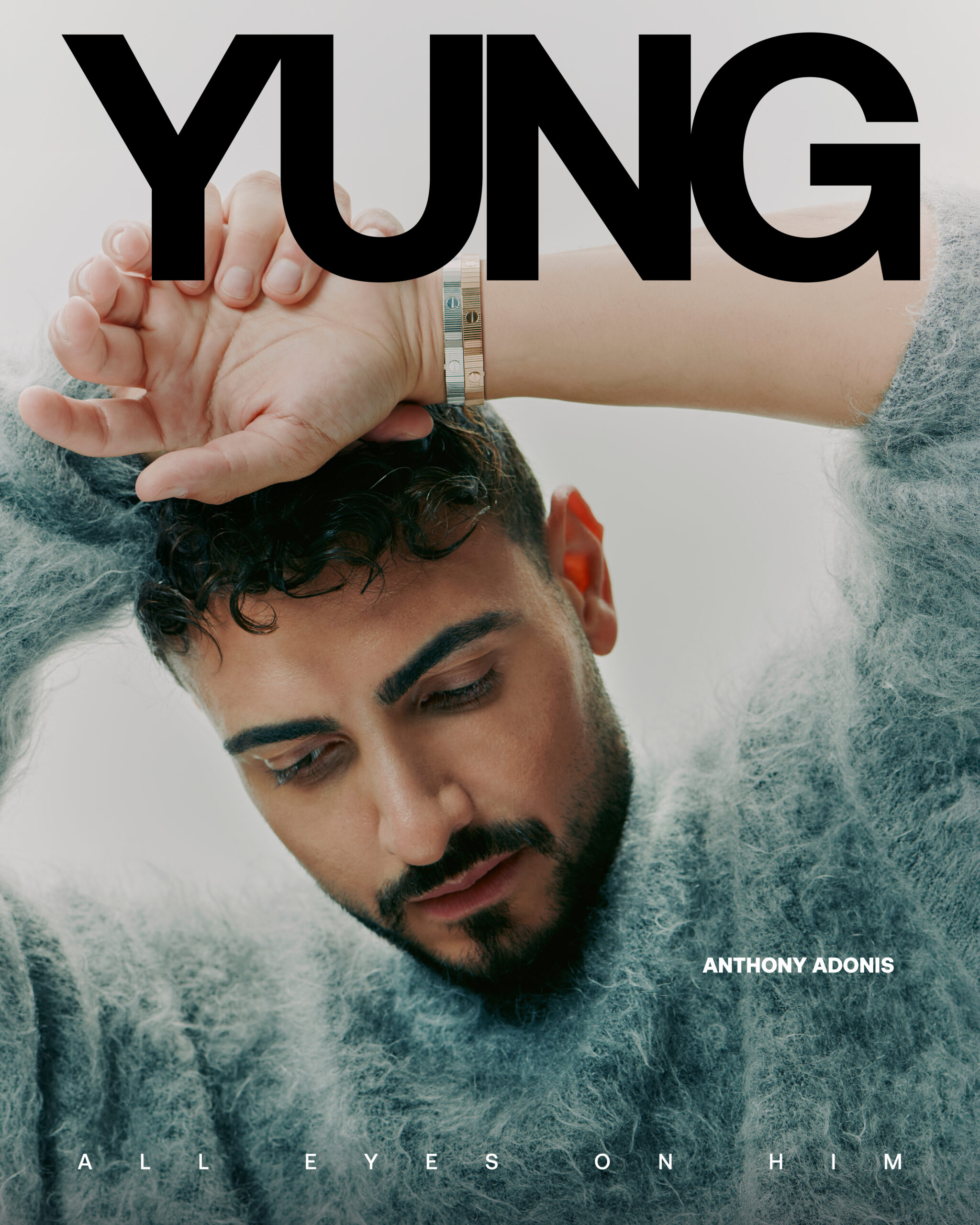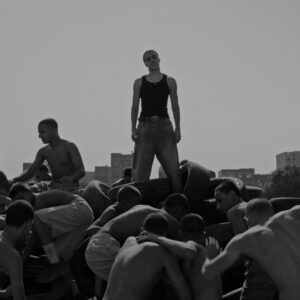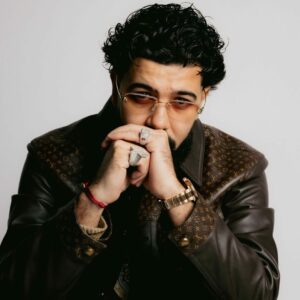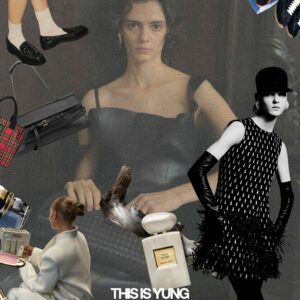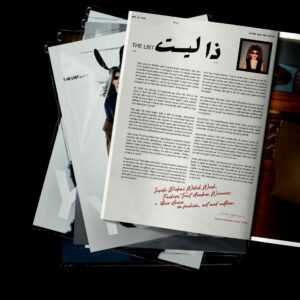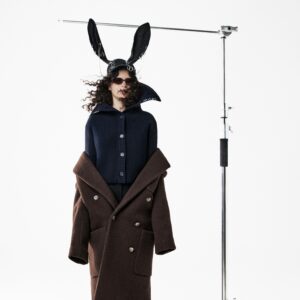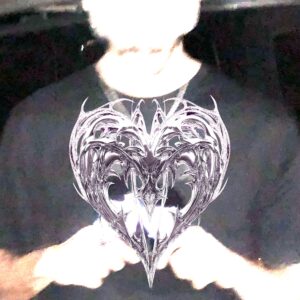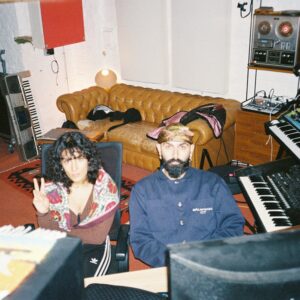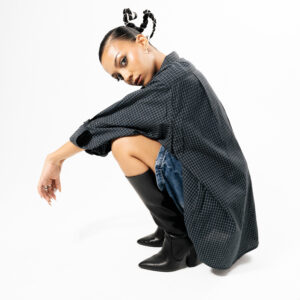“I write a lot. Maybe 10% of what I write ends up in the songs,” Anthony Adonis says to YUNG. For him, words are sacred terrain: every Adonis (Instagram) song begins not with a beat or riff but with language, treated as “something delicate and sacred,” he explains. That reverence has defined the band from the very start. When Anthony and guitarist Joey Abou Jawdeh launched the band in 2011, they began quietly, almost stubbornly, remoulding the contours of Levantine pop from the inside out.

Anthony’s songwriting is fundamentally word-centric as he notes, “Our music has always been about language, about the stories we tell”. He tinkers with multiple drafts on piano, revisiting verses and choruses until the phrasing lands with the right weight. But the lyrics are always the starting point, the music is the vessel, lovingly home built around each word. Over the years the band has grown “more playful” with instrumentation, he insists that “with lyrics we’ve been more rigid and careful, treating [the words] as something delicate and sacred”. Every colloquial turn-of-phrase, every lilt of dialect, is carefully crafted so that it “shines at its best in our songs” – a fitting credo for a band so deeply devoted to the nuances of Lebanese Arabic.
Though lyrics anchor their identity, Adonis’s sound has flowed through many styles over the years. Birthed amid Beirut’s cafes, the band’s early records wore an acoustic, folk-tinged sound, one of a generation still sketching its place. However, Anthony soon felt those four-chord indie motifs were starting to become limiting. By 2018, the band cut Nour in Beirut with producer Jean-Marie Riachi, a record he calls “one of the milestones of our career”. That album wove in drum machines and synths for the first time, breaking out of their indie/alternative mould. He admits resisting this, fearing that to older fans they might appear to be “selling out.” In fact, he remembers clashing with producers over whether electronic elements had a place in Adonis’s music.

As Anthony puts it, the balance between the band’s organic elements (guitars, raw vocals, heartfelt lyrics) and new, structured elements “made our sound stand out.” He laughs that he finally understood what the older musicians meant when they advised openness: taking risks and embracing new tools is simply part of growing up as an artist.
Each subsequent release burst further into new sonic territories that they once dared not touch: 2021’s A’da flirted with R&B and retro pop sounds, and 2022’s Hadith al-Layl embraced freer, more cinematic structures. Anthony says Hadith al-Layl “took us in a completely new direction,” and that it felt “wonderful to do something very different from what people are used to getting from us”. Each record has proven that Adonis can preserve its identity even as it reaches for the unexpected.

He makes no secret of his reverence for Arabic, especially the Lebanese dialect with its vast expressive potential. And it is so easy to pick that up in the poeticism that underlies all their songs, lines that stretch and coil, spoken cadences turned melodic. He often cites Lebanese composer Ziad Rahbani as a guiding light, saying Rahbani “freed the language” from rigid rules. What a striking phrase… to free a language. In Adonis’s songs, this means using dialect as playfully and powerfully as possible. Every phrase is chosen so that the Lebanese accent truly “shines at its best” on the track. In practice, this can mean double meanings, slang turns, or poetic repetitions – treating the colloquial tongue as a musical instrument in its own right. In Anthony’s hands, everyday speech becomes luminous.
Beirut itself looms over their work as both muse and adversary. “Sometimes you live life in its best and most beautiful moments. And then the second day… an explosion could rip your house apart,” Anthony says matter-of-factly. In his words, the city is “always, for better or worse, a theatre of surprises,” something that has taught him to keep steady, “so that you don’t crumble if it takes you in unexpected directions.” This hard-earned acceptance of chaos seeps into Adonis’s art: songs about sudden loss, stubborn hope or angry outbursts that carry the imprint of Beirut’s unpredictability. The city’s rhythms remind the band members that life can change in an instant, nothing is guaranteed, and that songcraft must capture that tension without flinching.

For all his meticulous writing, Anthony knows chance plays just as big a role. He laughs recalling “La Bel Haki,” a gentle pop number from Nour they nearly buried. “La Bel Haki was always meant to be a filler track… But it just sounded so naturally soothing,” he says. When they released it anyway, a Brazilian producer snapped it up as a telenovela theme. “The song travelled to Brazil and had Portuguese versions,” he grins. Overnight, a largely unknown Arabic song won a new audience and gave Adonis unexpected credibility.
Another twist hit the song “Ma’arfha,” from their seventh studio album. Its first demo was lush and orchestral – “like these show tunes from 1980s musicals” with strings and pizzicato. Producers Nasser al-Bashir and Amr Shomali completely reimagined it: “it evolved into this kind of dark synth track,” Anthony recalls. What began as a grand ballad ended up a pulsing, modern pop song and became one of his favourites. This just goes to prove that, for Anthony and other artists, constraints and random opportunities can collide to create something new. Follow where the music leads.

Anthony is just as fascinated by how songs escape their author’s control once released. One song from Adonis’s second album, written as a reflection on The Little Prince, has been lovingly misinterpreted by listeners. He explains that “the song is exactly telling the story of the Little Prince, from the point of view of one of the characters… I had read that book at the time while I was writing it.” Yet, he remembers a fan who sang the song to her unborn child, despite its original meaning. The artist says it was deeply moving, since “the song is about a young prince who left the world too soon,” that she reimagined it so tenderly. Her alternative meaning is “a very moving comment” that he still remembers “to this day”. Instead of correcting her, he embraces it, happy that a song could offer solace in an unexpected way.
Time has softened his once-rigid views about the craft. In his early days he thought the bare song itself was all that mattered: “I believed that the production of the song was the least important element in the making of a song,” he says with a laugh. “I would write a song on the piano… I didn’t have any interest in listening to different options of mixes.”
Back then, he thought a melody strong enough to survive on keys alone would remain intact under any treatment. In hindsight he calls that “arrogance.” Now he’s more open to experimentation. After working with different producers he acknowledges that production can add depth, even while insisting “if it’s good when you play on a piano… it means it’s a good song no matter how you dress it up”. He still writes lyrics and chords first, but today he checks on mixes, layers, and beats, anything to help a song speak.
He is also prolific, perhaps surprising even himself. He laughs that the band’s output is constant because “In my nature, I write a lot.” He describes mornings at the piano juggling three or four songs at once: writing a verse for one, a chorus for another, then switching back to a third. “I don’t know why that is,” he says, but it means the band always has a deep well of material. Most songs never get recorded, but that stream of ideas keeps the creative engine humming and prevents any sense of running out of fresh inspiration.

As he reflects on a decade of music, Anthony notices that his relationship with uncertainty has changed. Asked what 2011 Anthony would find shocking about 2025 Anthony, he pauses and then says, “How much he is at peace and at ease with everything that just comes his way.” The fires and failures of his early career once felt like crises. Now he sees each twist as a teacher. Experience has taught him, he explains, that things usually work out. He admits it’s a form of self-education: where he used to worry, now he’s comfortable with the unknown, trusting that change is part of the journey. As he puts it now, there’s a confidence in knowing that even the least likely track or the smallest creative choice can bloom into something beautiful. In the end, Anthony seems most grateful that music, like life, is never static, but always full of surprise.
Adonis did not emerge alone. Over the past decade Anthony has witnessed a flowering of experimental Arab music that he once thought impossible. He admits that years ago “the options we had were very limited.” It was a mainstream industry hungry for formulaic stars. But today he marvels: “These 10 years have been revolutionary… our industry is even more interesting… because it’s so prolific, so generous, so experimental”. New artists mix Arabic lyrics with hip-hop, R&B, electronic and jazz in daring ways. He applauds it: he’s “all for people trying the weirdest combinations”, believing that if something new finds an audience, it shows there’s room for it. In this vibrant scene, Adonis both contributes to and benefits from a culture where each milestone of change simply encourages the next.

Still, the band’s durability cannot be explained by industry trends alone. What has kept Adonis together for 13 years is far less about fame than friendship and humility. “We’re friends before being bandmates,” he emphasizes. That order matters. This personal bond means creative disagreements never become fatal. They’ll argue heatedly one morning and be having dinner together by nightfall. Even line-up changes were smooth. When Anthony’s brother (the original bassist) left the country, Gio (a long-time collaborator) stepped in with no fuss.
Crucially, none of the members put all their eggs in one basket. “We have multiple careers,” he points out, “so if something gets tough, it’s not life or death for any of us”. They also keep themselves in check. In his words, “we never had an issue with oversized egos,” and that humility has helped them navigate album tours and label pressures intact. Ultimately, he believes their collective writing thrives: “As four individuals, when we come together, we make something greater… we’re always better, more creative”. The band’s unity lets them take risks they couldn’t take alone.

What’s next for Adonis? By all indications the evolution continues. Their latest album, Wedyan, drifts confidently across genres and moods, yet still circles back to the lyrical core that has defined them from the beginning. As Anthony puts it, Wedyan “makes us feel that we can preserve our identity, but at the same time, we’re going in a new direction.”
After 13 years of leaning into uncertainty, that sentence might serve as the band’s motto. As Anthony says, this very long-term view “opens the possibility of another 12 years,” insisting that what matters most is keeping the work open-ended. It “means we have the possibility to continue in unexpected ways,” he says. For fans that means there’s a lot more of Anthony’s poetic Lebanese songs ahead, even if we’ll only hear the polished 10%.
For more stories of music from around the world, visit our dedicated archives.
